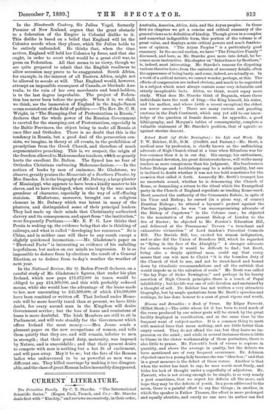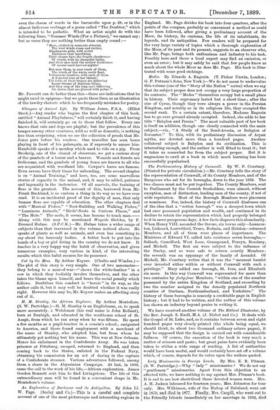Blooms and Brambles : a Book of Verses. By Edgar
Fawcett. (Elliot Stock.)—The critic whose lot it has been to read much of the verse produced by our minor poets will be struck by the great facility displayed in versification, and at the same time by the frequent want of subject-matter. It is a common thing to meet with musical lines that mean nothing, and are little better than empty sound. They do not offend the ear, but they leave no im- pression on the mind ; and while in several instances there is little to blame in the clever workmanship of these poetasters, there is also little to praise. Mr. Fawcett's book of verses is copious in quantity, and above the average in quality, but the defects we have mentioned are of very frequent occurrence. Dr. Johnson_ objected once to a young lady because she was "idea-less ;" and that in a great measure is the defect of these verses. Another is that when the writer has least to say, he uses words most freely, and. hides his lack of thought under a superfluity of adjectives. Mr. Fawcett, who is not strong enough to be simple, is so very nearly a poet sometimes, that we regret his defects all the more, and hope they may be the defects of youth. In a poem addressed to the moon, there is a painful effort to say fine things ; in another, in, which the speaker is Father Thames, the effort is more prolonged and equally abortive, and surely no one save its author can find
even the charm of words in the barcarolle upon p. 28, or in the almost ludicrous verbiage of a poem called "The Doubter," which is intended to be pathetic. What an artist might do with the following lines, " Summer Winds (For a Picture)," we cannot say ; but as verse they are nothing better than empty sound :-
" Here, clothed in raiments etherial, The west winds roam and recline, Diaphanous girls, with :Oriel intertwine.
Their that Their shapes have the fragile slenderness Of wheat, with its changeful lights, And their eyes hold the mellow tenderness Of moons amid harvest-nights!
But near them, in easy reach of them,
The winds of the warm south float. Voluptuous beauties, with each of them A wine-red rose at her throat I The folds of their tresses are pillowing Large blooms of delicious balms,
And they sing of the long sea's billowing
On shores that are plumed with palms !"
Mr. Fawcett can do better than this—there are indications that he might excel in epigram—but we quote these lines as an illustration of the tawdry rhetoric which he too frequently mistakes for poetry.























































 Previous page
Previous page